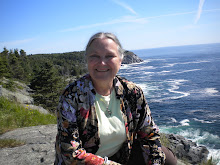When I read that there are more people out there in the world who claim to be Unitarian or Unitarian Universalist than there are members of our congregations, I am really confident that we have quite a congregation out there of folks who say they are "spiritual but not religious". True, some of those self-described Unitarian Universalists who don't attend our congregations are more skeptical than spiritual, but there are those who really do think they can be spiritual on their own.
To some extent, it's possible. Many of us prefer the church of nature, taking time out on weekends to go hiking or cross-country skiing or birding or whatever. This is good. Nature can be spiritually nourishing. Our spiritual ancestor, Henry David Thoreau, turned to nature for spirituality more than to other humans. But his friend, Ralph Waldo Emerson, chided him for being too often alone, and urged him to take someone else along on his rambles. Emerson thought there could be no spirituality without human companionship, it seems. Others of us just live our lives, reading books that remind us of the spirit, Conversations With God, Tuesdays with Morrie, books by Thich Nhat Hanh or the Dalai Lama, and contemplating life in what we hope is a spiritual way. But what is spirituality if it does not require anything of you beyond reading books? The spirituality based on books --even the spirituality based on attending occasional weekend workshops -- this is also incomplete without people with whom to talk it over, without the challenge to actually put the spirituality into practice.
Being "religious" can get to be a problem, though. You go someplace where people all believe some things in common, and what if you don't agree? I'm thinking there really are only a couple of things we believe in Unitarian Universalism, when it comes right down to it:
We believe in welcoming. We believe in trying to find our own spiritual paths. We believe in testing our experiences of the source of meaning and guidance through sharing with others as well as thinking it over for ourselves. And we believe in reaching out to help others, no matter where we or they are on our spiritual journeys. And that's about it.
Is it a religion? We think so. But you don't have to be "religious" to be part of it.
Tuesday, August 12, 2008
Subscribe to:
Post Comments (Atom)

3 comments:
Whatever the label, to me it's the life that testifies to the authenticity of it.
I think that a good number of those self-professed U*Us out there who have chosen not join a U*U congregation may actually be more religious than you think. It is a fact that a good number of U*U "churches" are not very welcoming to God believing people. Some God believing people visit so-called "Welcoming Congregations" only to discover to their chagrin that they are not genuinely welcome because they are to Christian-orientated in their beliefs or otherwise to theistic. Indeed even non-religious "spirituality" is not that welcome in some "Humanist" dominated U*U "churches".
They only way to find out why these people who self-identify as U*Us but have chosen not to officially join the "faith" is to ask them. I expect that there are a variety of reasons contributing to this fact but I believe that my thesis presented here is a major contributing factor and accounts for a significant percentage of non-attending U*Us. Another reason is the lack of U*U "churches" in many areas. It is simply not practical for some people who identify as U*Us to actually attend a U*U "church". Of course there might be a lot more U*U "churches" if God believing people, who make up the vast majority of the population of America, were genuinely welcome in U*U "Welcoming Congregations". . .
Alas, we usually only find out who they are when someone in their family wants a religious service at the time their ashes are to be buried. Sometimes we'll get a call when they are very sick and in the hospital. And now, we've at least heard from you while you're still alive and kicking.
I'm sorry you have felt unwelcome among us. We do welcome people with minority sexual orientations, and many of us do struggle to welcome Christians. (Some among us have suffered in their earlier lives from various kinds of abuse in "Christian" communities, but that's no excuse.) So you end up either unwelcome as same-gender oriented in you "old" church or unwelcome as Christian in ours. This is a truly regrettable situation.
We're working on that problem about not being available. We're still way too small!
Post a Comment